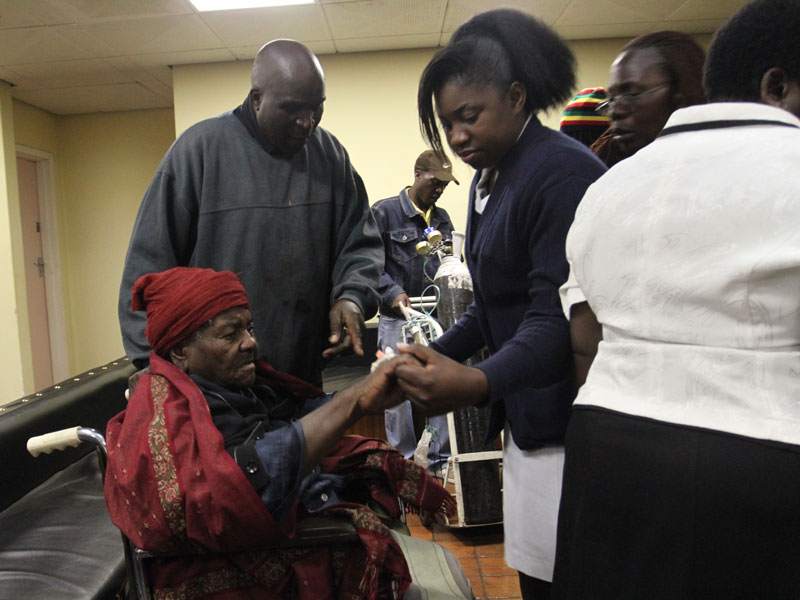
THE appalling state of public health delivery took centre stage in the National Assembly last week. By John Makamure
For a change, it was refreshing to see MPs debating an issue of critical public importance without the childish heckling that has characterised debate of late.
The Portfolio Committee on Health and Child Care kicked off the debate when it tabled its first report entitled “The state of affairs of the health delivery system in Zimbabwe”.
The committee inquiry focused on the following central hospitals: Parirenyatwa Group of Hospitals, Harare Central Hospital, Mpilo Central Hospital, United Bulawayo Hospitals, Ingutsheni Central Hospital and Ekhusileni Medical Centre. Esigodini District Hospital and Thorngrove Infectious Disease Hospital were also visited.
The committee, chaired by the MDC-T’s Ruth Labode, did an excellent job to come up with a very detailed report and set of recommendations that government should take seriously if we are to meet our health delivery commitments as enshrined in our Constitution, national health strategy (2009 to 2015), and various regional and international commitments.
Section 76 of the Constitution grants every citizen and permanent resident of Zimbabwe the right to have access to basic health care services, including reproductive health care services.
The State is required by the same section to take reasonable, legislative and other measures, within the limits of the resources available to it, to achieve the progressive realisation of this right.
Health care indicators clearly show that there is no progress in realising this right and that legislative and other measures to realise this right are not reasonable enough. A good example is budgetary support for public health care that has been declining over the years.
- Chamisa under fire over US$120K donation
- Mavhunga puts DeMbare into Chibuku quarterfinals
- Pension funds bet on Cabora Bassa oilfields
- Councils defy govt fire tender directive
Keep Reading
The amounts allocated to the Ministry of Health and Child Care in the last couple of years is less than 10% of the total budget.
This is far below the Abuja Declaration of at least 15% to which Zimbabwe is party to. What is of serious concern is that less than half of the amount allocated is actually disbursed. Only 18% of the budget was disbursed in 2014, thereby making a mockery of the whole budgeting process.
Reduced budgetary support largely explains why some key health indicators are on a downward trend. Zimbabwe has made significant strides in HIV prevalence and life expectancy at birth but others such as neonatal, postnatal, maternal, and infant and child mortality rates have not improved.
The committee noted in its report that non-communicable diseases are on the increase, in particular diabetes and hypertension. Prostate Cancer is now the leading cancer among Zimbabwean black men, accounting for 16,5% of the new cases in 2011. The most frequent cancer among black women was cervical cancer (37%) followed by breast cancer (11%).
The committee also found out that infrastructure at most of the central hospitals was in a dilapidated state. “Most of the central hospitals are overcrowded, with broken beds and benches, and obsolete hospital equipment.
The buildings are falling apart and all need a face- lift. There is water shortage because of old leaking pipes.
There is also lack of linen and staff accommodation,” the committee reported. If such a finding is not a time bomb, then I don’t know what the term means.
The committee is therefore absolutely right to recommend 100 percent disbursement of the funds allocated for health and that development partners (that have done an incredible to slow down the rapid slide in the sector) should fund central hospitals as these play a key role of being referral centres for the marginalised from communities.
The committee findings and recommendations are also supported by some non-State actors such as the Zimbabwe Women’s Resource Centre and Network, which noted in its analysis of the 2015 budget that whilst significant donor support to health delivery system in Zimbabwe was commendable, this was not a sustainable strategy, and that core resources that match or compliment donor support were required from government to ensure that public health financing was sustained in the long term.
The MPs must therefore in a non-partisan manner engage the government to provide adequate funding to address the following issues, among others: reduction in maternal mortality rate; improved functionality of primary health care clinics and referral hospitals; improve the functionality of infrastructure and assets at central hospitals and rural health centres; and improve maternal health care by doing away with user fees.
The other important issues include capitalisation of NatPharm to enhance drug availability and management, and allocating adequate resources for cancer testing and treatment.
It is shocking to see that NatPharm was allocated $2,5 million in the 2014 budget but there was no disbursement at all. There is no stand alone budget line item for cancer testing and treatment, yet the disease has become one of the most deadly killers in Zimbabwe.
The ZWRCN observed that while $270 000 was allocated to finance village health workers in 2014, not a single cent was disbursed.
The allocation for 2015 was reduced to $150 000 despite the fact that this is one of the most critical health delivery strategies for meeting the health needs of communities, particularly women as regards maternal and child care.
The sorry state of our health delivery system is there to see for all MPs, whether belonging to Zanu PF or MDC. We expect serious and objective debate because this is about the lives of the people. Health minister Dr David Parirenyatwa and Finance minister Patrick Chinamasa must come to the House with substantive responses to the issues raised if we are to rescue the public health delivery system from total collapse.
John Makamure is the Executive Director of the Southern African Parliamentary Support Trust. Feedback: [email protected]












